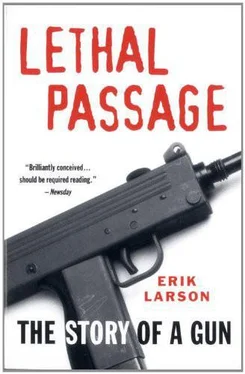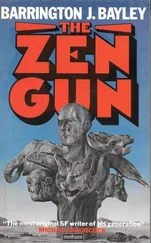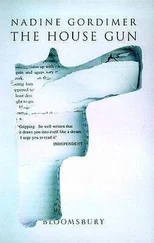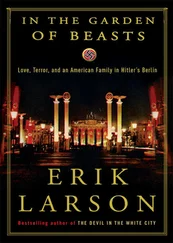All this for skimpy profits in a crumbling national industry facing ever-more-stringent controls.
“Why,” I asked Dick, “do you stay in the business?”
“That’s a difficult question. I come out of the hospitality industry, hospitality is my first love. I came here out of necessity to help my father. It has become a challenge to me, taking a declining business under constant siege by various aspects of society—it is a monumental challenge. My goal is to become profitable enough that at some point we can sell and I can go back to what I do best, and that is run hotels and restaurants.”
I asked Raymond Rowley, the ATF special agent who investigated Nicholas Elliot’s acquisition of his gun, how he would describe ATF’s relationship with Guns Unlimited.
“I would say it’s a good relationship,” Rowley said. “We try to deal with all these firearms dealers as fairly as we can. They are selling a legal commodity. Obviously, guns can be used in crimes. We try to deal with them fairly.”
Baltimore County’s Col. Leonard Supenski was a bit less circumspect. Of James Dick, Mike Dick’s father, he said, “That guy is a pariah. He ought to be turned out of that industry. But ATF didn’t do anything—ATF should have nailed him to the cross.”
ATF, indeed, plays a curious role in regulating the commerce of guns. A division of the Treasury Department, it is a bastard agency to which America has grudgingly assigned the well-nigh-impossible task of ensuring that the companies that make and distribute booze, cigarettes, and guns—together the nation’s most prolific killers—pay their taxes and operate within a set of rules designed not to prevent the killing, but to keep it honest.
“NOW YOU,” NICHOLAS SAID.
Susan Allen had seen Sam Marino literally backing Nicholas into a comer of the classroom; she heard Marino insist that Nicholas hand over the gun. Then she saw Marino’s body jump. She saw the books and folders he was carrying fly in all directions. She heard Marino cry, “My God, my God,” and she watched as he fell forward.
And now this boy—this gangly black child with the sweet smile and serious demeanor, a student in her algebra class—had just turned toward her and pointed his gun at her, saying, “Now you.”
She sprinted toward the door, then out and down the short flight of steps. Nicholas followed.
At first she planned to run to the school’s main building to try to get help for Marino and have someone call the police, but realized that if she did so, she would lead Nicholas right to the heart of the school. She headed instead for the church.
She knew Nicholas was shooting at her. She heard one shot as she left the trailer. A few moments later, she heard another. She had the good sense to run serpentine fashion like a character in a grade-B war movie as Nicholas fired shot after shot at her back, sweeping the courtyard with a back-and-forth motion, stopping his pursuit now and then to clear a jammed cartridge. For Allen and Nicholas both, the sound was deafening. Her ears rang. His hurt.
After each shot she would pause an instant, wondering if she had been hit, waiting to see if she would fall. Then immediately she’d start running again, glancing back at intervals to see where Nicholas was and if he was still pursuing her.
Allen reached the end of the courtyard. With nowhere else to go, she made a sharp turn around the end of one of the classroom trailers. Something struck her with shocking force and knocked her immediately to the ground—with Nicholas close behind, firing at her, she had turned that corner and run face first into a utility shed.
“I hit the shed full force,” she said. “I hit it, fell down. There was ringing around my ears. I fell down, and I was trying to get underneath the trailer—trying someway to get away.”
Breathless and petrified, she wriggled under the trailer.
“It was not the smartest thing to do, if you think about it,” Detective Adams told me.
As she lay there, she struggled for breath. She was indeed trapped. She watched Nicholas’s legs as he advanced along the pavement outside.
“My God, make him stop,” she whispered. “My God, please make him stop.”
He took two more steps in her direction.
Then turned around.
♦ ♦ ♦
Two things had distracted Nicholas: a loud thumping noise nearby, and Sam Marino, who, wounded in the shoulder, now stood at the door to room T108. When Susan Allen had fled the room, Marino recalled, Nicholas had run past him in pursuit. “I got myself up off the floor… and noticed my shoulder had a tremendous ache in it.” He moved toward the door, opened it, and shouted for help: “Please help me. I’ve been shot. I’ve been shot.”
“All of a sudden,” he said, “I looked down the steps and there he was again.”
Nicholas stood only three or four feet away, at the bottom of the steps. This time he aimed a bit lower. The gun, once advertised by its manufacturer as “the gun that made the eighties roar,” roared again. There was an elliptical flare. The bullet penetrated Marino’s abdomen.
Marino fell onto the steps, then managed to stand again. He allowed himself to fall inside the classroom. He grabbed the doorknob, shut the door, and locked it.
Nicholas tried to open it, then gave up.
Meanwhile, the thumping had gotten louder. Nicholas knew the noise. He had heard it before during a class, when kids in a nearby trailer had been playing a game to see who could stamp hardest on the floor of the trailer.
In this case, however, the thumping was the sound made as terrified students scrambled to the rear of the trailer. On any other Friday, Nicholas would have been in that trailer, attending the Bible class taught by Hutch Matteson.
Marino, who had by now pulled himself to a window of room T108, watched as Nicholas crossed the courtyard, climbed the steps of the opposite trailer, and shot out the glass window in the door.
♦ ♦ ♦
Hutch Matteson had heard a loud explosion; like Marino, he assumed at first it had been generated by a large firecracker. He looked over his shoulder out the window of his classroom. “I saw Mr. Marino hanging out of the door yelling, ‘Help. Help. He shot me, I’ve been shot.’ At the time I didn’t think that it was a real incident because I thought perhaps he was doing a demonstration for a class; so I began to walk over to the doorway of the class. As I opened the door, I took a step out and looked down the courtyard towards the church building. I saw Nicholas Elliot coming from that direction towards me. I shut the door and stood back against the wall glancing out of the door.”
Nicholas was carrying what looked to be a gun. “It appeared to me at that point it was sort of like an Uzi water pistol because it seemed very small at a distance.” (Cobray pistols are often confused with Uzis, police say.)
Through the glass window in the door, Matteson watched Nicholas approach. “I saw Nicholas go up to Mr. Marino. He was still hanging out of the door. He was approximately four to five feet away from him. I heard the shot go off.”
Matteson turned to his students.
“I told them to get down and get back, so the class quickly started to move to the back of the trailer. One young man had the presence of mind to come up, and he locked the door.”
The students—some three dozen of them—crouched at the back of the classroom, praying and crying. Matteson took up a sheltering position halfway between the students and the door and stood to see where Nicholas had gone.
“I was watching Nicholas as he came towards us. I thought perhaps he might go around the trailer. He came up to the stairway, tried the door. The door was locked. At that time, he shot the glass out and entered the room.”
Читать дальше








![Ричард Деминг - Whistle Past the Graveyard [= Give the Girl a Gun]](/books/412176/richard-deming-whistle-past-the-graveyard-give-t-thumb.webp)



